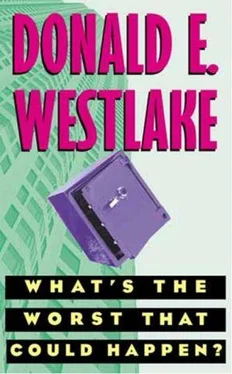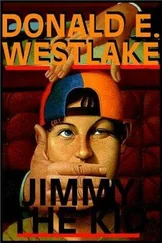* * *
The corridor on seventeen had almost the same colors of walls and doors and carpet as the corridor on twenty-six, but not exactly, so that your first idea was that something had gone wrong with your eyes. On that floor, Dortmunder and Andy checked out all three service clusters, north, west, and south (west being the one that should be above the Fairbanks apartment), and found nothing they hadn’t already seen on twenty-six. Sighing, Andy looked at his watch and said, “And it was gonna be so simple.”
“It is simple,” Dortmunder said. “We can’t get in.”
“There’s gotta be a way. Do they keep a maid chained up in there? How does she get new soap? How does she get rid of the old sheets?”
They were standing in the public corridor again, near the public elevators in the middle section. The Fairbanks apartment should be directly beneath their feet. Dortmunder looked up and down the corridor and said, “We need another door. A door without a number on it.”
“Sure,” Andy said.
They moved southward down the corridor, and by the time they’d got to the turn they’d found three unmarked locked doors, unlocked them all, and found first a room full of maids’ carts and vacuum cleaners, then a room full of television sets and lamps, and then a bathroom, probably for staff. So they turned and went the other way, and north of the elevators they found a locked and unmarked door that opened to a great tangle of pipes; heat or plumbing or both. And the next door they opened was an elevator, with a maid’s cart in it.
“Well, look at that,” Andy said.
“Somebody coming,” Dortmunder said, having heard the public elevator stop, down the hall. Moving as one, like a very small flock of birds wheeling in the air, they stepped into this new hidden elevator and let the door snick shut behind them.
Now it was dark. They both patted walls until Andy found the light switch, and then it was okay again.
This was an elevator like the service elevators, simple and rectangular and painted industrial gray. Its control panel was even simpler: two buttons, neither of them marked. And just to remove any last vestige of doubt, the maid’s cart contained boxes of stationery marked, in fussy lettering, MF or LF .
There was a keyhole in the control panel, just above the buttons. Andy stooped to study it, then straightened again and said, “No.”
Dortmunder looked at him. “No?”
“This is not your ordinary lock,” Andy said.
“No,” Dortmunder agreed. “It wouldn’t be.”
“Your ordinary lock I shrug at,” Andy explained. “But not this. And I suspect,” he went on, “that it probably has an alarm in there behind it, to go off in some security office somewhere if anybody sticks a bobby pin or anything in that keyhole.”
“Wouldn’t surprise me,” Dortmunder said.
“In fact,” Andy said, “it would be my opinion that it would be safer to go through the floor and shinny down the cable or climb down the rungs, if there’s rungs, than to fool around with this lock here. If we turn the screws there and there and there and there to take the face off the control panel, just to see what’s what and how come, that could send a signal to security.”
“I don’t doubt it,” Dortmunder said.
“So let’s take a look at this floor here.”
They moved the cart as far back as possible, then got down on hands and knees and looked at the floor. It was plywood, four large sheets of plywood, screwed down and painted gray. They rapped the plywood with their knuckles, and the sound was flat, not echoing. They looked at each other, on all fours, like dogs meeting at the neighborhood fire hydrant, and then they got to their feet and Andy said, “Steel underneath.”
“I noticed that,” Dortmunder said.
“No trap door for access to the machinery or anything.”
“That’s right.”
“So the machinery’s probably up above.”
They looked upward, at the plain gray-painted roof of the elevator, and in the rear right quadrant were the clear outlines of a trap door. And in the trap door was a keyhole. “They’re beginning to annoy me,” Dortmunder said.
“Us guys don’t give up,” Andy said.
“That’s true,” Dortmunder said, “though I sometimes wonder why.”
“When the going gets tough,” Andy said, “the tough get an expert. I know when a lock is beyond my simple rustic skills. What we need is a lockman.”
“You want to bring somebody in?”
“Why not? What we pick up in that place down there we split three ways instead of two. You don’t care anyway, you just want your ring.”
“That’s also true,” Dortmunder admitted. “But a little profit would be nice.”
“I’ll see if Wally Whistler’s around,” Andy said, “or Ralph Winslow, they’re both good. I’ll show them the pictures in that magazine, they’ll pay us to come along.”
“I wouldn’t hold out for that,” Dortmunder said, and looked at the damn keyhole in the damn control panel. “Here we are, right here and all,” he said, “and the ring right down there underneath us. I can feel it.”
“We’ll get it,” Andy assured him, and looked at his watch and said, “But not tonight. Tomorrow night.” He turned to unlock the door to the corridor. “Tonight I kinda got an appointment, I wouldn’t want to be late.”
Dortmunder frowned at him. “An appointment? This time of night?”
“Well, New York, you know,” Andy said, and opened the door cautiously, and stuck his head out just a bit to see if the coast was clear, and nodded back at Dortmunder, “the city that never sleeps.”
Dortmunder followed him out to the corridor, and behind him the unmarked door snicked shut. “New York, the city with insomnia,” he said. “Is that a good idea?”
“See you tomorrow,” Andy said.
Most of the guests staying at the N-Joy Broadway Hotel, when they got up in the morning, went out sight-seeing, but not the Williamses. They got up and went out, like everybody else, but Mrs. Williams then became May Bellamy and went to work at the supermarket downtown, while Mr. Williams reverted to one John Dortmunder, who went home to East Nineteenth Street, where he did what he usually did at home all day long, which wasn’t much.
It had been agreed that Dortmunder and May would get together back at the hotel at six, to add another hotel meal to the credit card tab they were running up, and then wait for Andy Kelp and X Hour to arrive, which they figured to be midnight; this evening, they’d try not to fall asleep. So at about five-thirty, Dortmunder left the apartment, and when he opened the street door downstairs who was coming up the stoop but Gus Brock. “Hello,” Dortmunder said.
“Hello,” Gus said, and stopped there on the steps.
Dortmunder said, “This is not a coincidence, am I right?”
Gus scrinched up his eyes. “What isn’t a coincidence? I came over to see you.”
“That’s what I meant. I’m walking uptown.”
“Then so am I.”
They started walking together, and after they made the turn onto Third Avenue and headed uptown Gus said, “I read in Newsday where we scored pretty good out on the Island last week.”
“Oh, yeah?”
“That was us, wasn’t it? Took all that stuff from that big house in Carrport?”
“Us?” Dortmunder asked. “How do you figure ‘us’?”
“Well, you know, John,” Gus said, “you didn’t know about that place, I did. You didn’t know about the Chapter Eleven and all that, and I did.”
“Except the guy was there,” said Dortmunder. “So much for all your chapters.”
“It was our little job, John,” Gus said. “I’m just asking you to consider the situation and you’ll see it would be fair I should get a piece of this. Maybe not half , I’m not a greedy guy, but—”
Читать дальше












